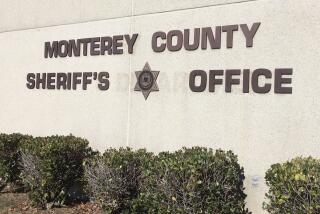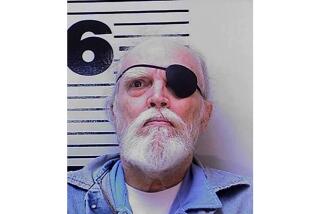Lawyer Blames Client’s Amnesia for 2 Shop Killings : Courts: Douglas Stanley, 58, of Westminster is accused of slaying his sister-in-law and a co-worker. Prosecution contends that grudges--not medical conditions--led to 1993 shootings.
- Share via
SANTA ANA — A Westminster man was suffering from a form of amnesia triggered by stress and a bad heart when he gunned down his sister-in-law and another woman in July, 1993, and then fled to Colorado where he was later captured, a jury was told Tuesday.
The unusual defense was revealed during opening statements in Orange County Superior Court as trial began for Douglas F. Stanley, 58, who faces life in prison without parole if convicted of killing Joyce Stanley and Terry Vasquez at the Fountain Valley embroidery shop where the three worked together.
Prosecutor Robert Molko told jurors that Stanley plotted the killing because of longstanding grudges against the women, and blamed his sister-in-law for his estrangement from his daughter. He also did not like having the two women as his supervisors at the business, which was owned by Joyce Stanley, 52, Molko said.
But as Stanley sat impassively, his head cocked to one side, Deputy Public Defender Denise Gragg told the jury that her client could have not premeditated the killings--a factor needed to prove first-degree murder--because the brain damage he was suffering rendered him unaware of his actions.
“He is in, essentially, a stroke” at the time of the shootings, Gragg told jurors, adding that her client began suffering “transient global amnesia,” and only snapped out of the trance-like state when he found himself driving his sister-in-law’s car in Colorado.
For the first time, the trial’s opening arguments offered some insight into the July 8, 1993, shooting, which sparked a nationwide manhunt for the fleeing suspect. Stanley was captured July 11, after a gun fell out of one of his pants legs while he was talking to a Colorado state trooper.
Family tension dates back at least to 1991, the prosecutor said. The defendant’s brother and sister-in-law, Charles and Joyce Stanley, sought guardianship of the defendant’s daughter, Lisa, at that time, because of Douglas Stanley’s transient lifestyle.
Although he did not fight the guardianship, he blamed Joyce Stanley for his poor relationship with the girl, Molko said.
“He never forgave Joyce for what he termed ‘taking Lisa away from him,’ ” said Molko, who told jurors that the defendant boasted to a friend shortly before the killings that he was finally about to get his revenge. He also called a friend after the killings and bragged “I did it!” Molko said.
In an ironic twist, the victim seemed to care about the defendant. Joyce Stanley nursed the defendant back to health after by-pass heart surgery about a year before the killing and was constantly urging him to take care of himself, Molko said.
*
In an apparent effort to undermine defense contentions about Stanley’s diminished capacity, Molko also stressed in his opening statement that Douglas Stanley withdrew a large sum of money from the bank shortly before the killing, repeatedly lied about his involvement in the slayings, and successfully eluded authorities for several days.
Friends described Stanley as a “survivalist” type who collected guns and made it a habit to threaten people who angered him. Gragg told jurors those were hollow threats, and noted that relatives never feared Stanley in the past.
But there is at least some evidence, according to the prosecutor, that relatives shied away from confronting the defendant. Joyce and Charles Stanley were planning to move their business out of state and secretly bought a house near the new location.
They were taking Douglas Stanley with them to a new apartment, but then planned to move to the new house and leave Douglas Stanley behind, Molko told jurors. Stanley also was angry because he believed Vasquez knew more about the relocation arrangements than he did, Molko said.
More to Read
Sign up for Essential California
The most important California stories and recommendations in your inbox every morning.
You may occasionally receive promotional content from the Los Angeles Times.














